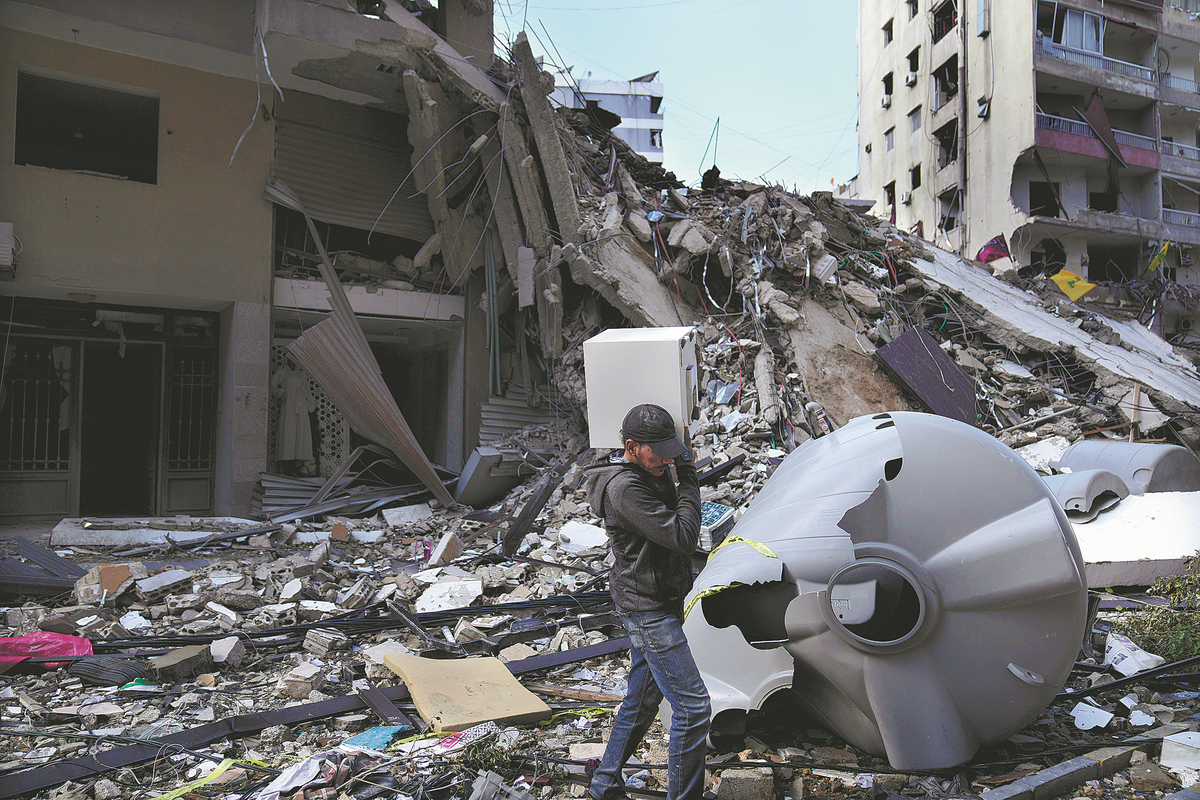
A man carries a safe box after pulling it out of a building destroyed by an Israeli airstrike in Dahiyeh, in the southern suburb of Beirut, Lebanon, on Monday. HUSSEIN MALLA/AP
Newly appointed Israeli Defense Minister Israel Katz said on Monday that Iran was "more exposed than ever to strikes on its nuclear facilities".
"We have the opportunity to achieve our most important goal — to thwart and eliminate the existential threat to the State of Israel," Katz added on X.
Israel and Iran have traded tit-for-tat missile strikes. Iran twice fired missiles directly on Israeli territory this year, prompting Israel to retaliate, most recently on Oct 26, when it hit Iranian military facilities.
Israel has warned Iran against responding to last month's attack, which triggered fears of a wider war in the Middle East, a region already in turmoil with the Palestine-Israel conflict in Gaza and regular exchanges of fire between Israel and Lebanese armed group Hezbollah.
Lebanon's official National News Agency said Israel launched at least 10 airstrikes on southern Beirut on Tuesday morning, shortly after Israel's army urged residents to evacuate the Hezbollah bastion.
"Israeli warplanes launched a very violent 10th strike on Beirut's southern suburbs," it said.
Since Sept 23, Israel has intensified its air campaign, mainly targeting Hezbollah strongholds in Lebanon's east and south and in southern Beirut. A week later, it sent in ground troops.
It came after nearly a year of cross-border fire, launched by Hezbollah in support of its Palestinian ally Hamas following their Oct 7,2023, attack on Israel that triggered the Gaza conflict.
Israel's retaliatory campaign has killed more than 43,665 people in Gaza, according to the Hamas-run territory's health ministry.
On Monday, Arab and Muslim leaders demanded that Israel withdraw from occupied Palestinian territories as a precondition for regional peace, while denouncing "shocking" Israeli crimes in Gaza.
A summit in Saudi Arabia's capital Riyadh gave the Arab League and the Organisation of Islamic Cooperation's 57 nations a chance to speak with one voice on the turmoil engulfing the region, more than a year into the conflict in the Gaza Strip.
Saudi Crown Prince Mohammed bin Salman Al Saud said the world must "immediately halt the Israeli actions against our brothers in Palestine and Lebanon" and condemned Israel's campaign in Gaza as "genocide".
He also urged the international community to stop Israel from attacking Iran and to respect Iran's sovereignty.
Jasim Husain, a Gulf analyst and former member of Bahrain's parliament, told China Daily that the statements were "excellent Saudi positions".
"Saudi Arabia is asking Israel the price it needs to pay if it wants ties with it," Husain said.
Gokhan Ereli, a Gulf studies coordinator at the Center for Middle Eastern Studies in Turkiye, said the characterization of Israel's actions as "genocide" marks a significant escalation in Saudi Arabia's stance toward the Gaza conflict.
"This strong condemnation reflects a strategic shift, likely influenced by domestic public opinion and regional dynamics," said Ereli.
"Domestically, the Saudi leadership faces pressure to support the Palestinian cause, aligning with widespread public sentiment. Regionally, this rhetoric may signal a realignment of alliances, potentially bringing Saudi Arabia closer to Iran, a staunch critic of Israel."
The development "complicates "US-led efforts to normalize Saudi-Israeli relations and could influence broader Middle Eastern alliances and policies, he said.
By taking such a decisive stand, Saudi Arabia is positioning itself as a leading voice in the Arab world, reinforcing its influence over regional politics, he added.
"This move also counters narratives that portray Riyadh as pivoting away from traditional Arab and Islamic priorities due to its previous talks with Israel," said Ereli.
"This strong rhetoric could act as a signal to other regional players that Saudi Arabia is willing to reevaluate its strategic partnerships and alliances, emphasizing its independent foreign policy approach amid shifting geopolitical currents in the Middle East."













